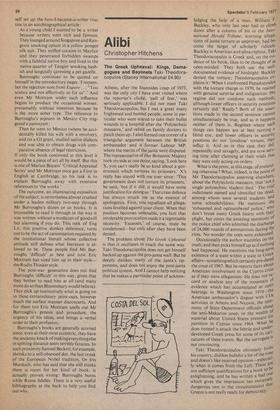Alibi
Christopher Hitchens
The Greek Upheaval: Kings, Demagogues and Bayonets Taki Theodoracopulas (Stacey International £4.90)
Athens, after the Ioannides coup of 1973, was the only city I have ever visited where the reporter's cliché, 'pall of fear,' was seriously applicable. I did not meet Taki Theodoracopulos, but I met a great many frightened and hunted people, some in particular who were scared to take their bullet wounds to a hospital after the 'Polytechnic massacre,' and relied on family doctors to patch them up. I also formed one corner of a , triangular argument between the British ambassador and a former .Labour MP, where the merits of the junta were disputed. The representative of Her Britannic Majesty took my side at one point, saying, 'Look here X, you can't really be so kind about a government which tortures its prisoners.' X's reply has stayed with me ever since: 'This government does not torture its prisoners,' he said, 'but if it did, it would have some justification for doing so.' That crass defence has always struck me as the essence of apologetics. First, you repudiate all allegations levelled against your client. When that position becomes untenable, you hint that intolerable provocation made it a regrettable necessity. 'Excesses,' of course, must be condemned—but only after they have been denied.
The problem about The Greek Upheaval is that it oscillates in much the same way. Taki Theodoracopulos does not get himself backed up against the pro-junta wall. But he deeply dislikes many of the junta's opponents, and does not enjoy the post-junta political system. And I cannot help noticing that he makes a particular point of acknow
ledging the help of a man, William F. Buckley, who only last year had to climb down after a column of his in the International Herald Tribune, scorning allegations of junta torture as unproven, had become the target of scholarly ridicule: Buckley is American and ultra-rightist. Taki Theodoracopulos is Greek and, on the evidence of his book, likes to be thought of as open-minded. They both use the welt documented evidence of hindsight. Buckley denied the torture; Theodoracopulos explains i t: 'When I confronted Papadopoulos with the torture charge in 1970, he reacted with genuine surprise and indignation. Ho regime did not condone such methods, although-lower officers in security positions certainly did.' Really? Both of the assertions made in the second sentence cannot simultaneously be true, and as it happens neither of them is. Regimes where such things can happen are at best turning. a blind eye; and lower officers in security positions do not 'condone' torture, theY inflict it. And so in this case they did, repeatedly and savagely, and are now serving time after claiming at their trials that they were only acting on orders. What is the point, at this stage, of pretending otherwise? What, indeed, is the point of Mr Theodoracopulos asserting elsewhere, about the Polytechnic massacre, that 'not 3 single polytechnic student died.' The trial indictment named and identified the dead, among whom were several students and some schoolchildren. He mentions the 'exhausted and outnumbered police,' who don't break many Greek hearts with their plight, but omits the amazing testimonY or the police chief who admitted the discharge of 24,000 rounds of ammunition during the riots. No wonder the cops.were exhausted. Occasionally the author stumbles on the truth, and then picks himself up as if nothing had happened. He mentions the long-ter existence of a state within a state in Gree,k affairs—something which certainly pre-date" the coup of 1967. But he reports facts about American involvement in the Cyprus crisis as if they were allegations. He does not re: cord or analyse any of the mountain OI evidence which has accumulated at orieo hearings in Washington since I974--the American ambassador's disgust with Cl. activities in Athens and Nicosia, the testi' mony of State Department officials aboet, the anti-Makarios coup, or the wealth or material about United States pressure for partition in Cyprus since 1964. What he does instead is attack the febrile and under.developed Greek press for some of its car!catures of these events. But the surrogate IS not convincing. Taki Theodoracopulos obviously loves his country, dislikes bullshit a lot of the titfl1,e. and doesn't like received opinion—especial ly when it comes from the Left. These are not sufficient qualifications for a book to be enlightening, and he has written a bad oil which gives the impression (an extremelYt dangerous one in the circumstances) tha Greece is not really ready for democracy.


































 Previous page
Previous page